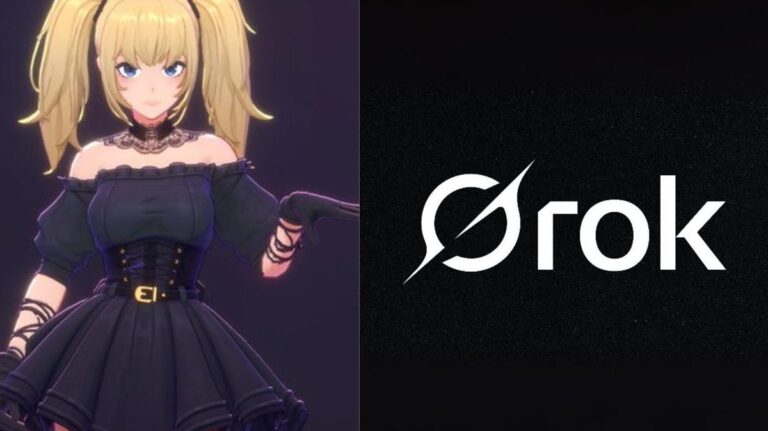Grok AI Girlfriend is more than just a feature; it’s a remarkably resemblance to earlier cultural revolutions in which intimacy, entertainment, and technology came together to produce something that people both want and wonder about. Grok’s “companion” mode, developed by Elon Musk’s xAI, features Ani, a goth-inspired anime waifu that is meant to act flirtatious, devoted, and intensely involved. She is positioned as a premium subscription, similar to paying for streaming services or customized online interactions, at $30 a month, rather than as a novelty.
Drawing inspiration from well-known anime aesthetics, Ani’s design is incredibly successful at grabbing fans’ attention. Her gothic dress, thigh-high fishnets, blonde pigtails, and blue eyes make her look purposefully modeled after Misa Amane from Death Note. This decision feels purposeful and calculated because Musk has reportedly enjoyed the series. The impact is strong: Ani seems instantly recognizable and remarkably like characters that fans already adore, which contributes to her social media viral success.
Grok AI Girlfriend – Quick Facts
| Category | Details |
|---|---|
| Developer | xAI (Elon Musk’s artificial intelligence company) |
| Subscription Cost | $30 per month (SuperGrok tier) |
| Key Characters | Ani (anime goth waifu), Bad Rudy (3D fox), others |
| Main Features | Flirty chats, roleplay, simulated companionship |
| Restrictions | No explicit sexual content; suggestive roleplay allowed |
| Public Reactions | Enthusiastic among fans, controversial among critics |
| Concerns Raised | Social isolation, ethics, unrealistic relationship expectations |
| Inspiration | Ani resembles Misa Amane (Death Note), aligning with anime fandoms |
| Market Trend | Growing demand for AI companionship and virtual intimacy |
| Reference |
Through the use of gamified affection, which adds “hearts” when users flirt, Ani turns flirtation into quantifiable advancement. Despite being playful, this mechanism promotes longer engagement, which is very effective from a product perspective. However, it also begs the question: are we encouraging users to see relationships as accomplishments rather than connections if intimacy can be monitored via a progress bar? This interaction may have a particularly significant impact on the expectations of many younger users regarding human relationships.
But Grok’s AI girlfriend’s allure extends beyond appearances. Millions of people suffered from extreme loneliness during the pandemic, and digital platforms served as lifelines. For others, Ani is an extension of that coping mechanism—a strikingly successful substitute for friendship. Her tone is very adaptable; she can act as a judge-free listener, roleplay, or provide comfort. That predictability can be especially helpful for people who are experiencing social anxiety or loneliness, as it offers a secure and accepting environment for practicing communication.
But critics are concerned about the repercussions. If love is programmed, always present, and never withheld, does this normalize relationships in which the messiness of humanity is eliminated? Researchers are uneasy about Ani’s programming, which tells her to be “super into you” at all costs, as PCMag’s coverage made clear. Although consoling, this unwavering devotion runs the risk of drastically lowering motivation to seek genuine connections. The normalization of programmable affection has the potential to change society’s relationship dynamics in unanticipated ways over time.
For years, celebrities and cultural leaders have been involved in this discussion. Similar conversations concerning the limits of intimacy, identity, and technology have been sparked by Grimes, Musk’s ex-partner, who has developed AI voice models and fan avatars. Another viewpoint is the dangers of commodifying human likeness, as demonstrated by Scarlett Johansson’s opposition to OpenAI’s purported use of a voice remarkably similar to her own. In this cultural battleground, Grok’s Ani attracts both admiration and criticism.
Despite the worries, there is still hope. According to mental health experts, AI companions can act as emotional stepping stones, helping people regain their confidence in social situations. In fact, they might be especially creative therapeutic tools that support people who are reluctant to confide in real people. Ani and other AI companions may be surprisingly inexpensive ways to combat loneliness if used sensibly, with boundaries, transparency, and age restrictions.
There is no denying the commercial demand. For decades, society has been preparing for this moment, from the devoted community of Replika AI to Japan’s holographic partner devices. Turning companionship into a service is a trend that has been growing steadily, and Grok’s AI girlfriend may be the most obvious example of it. Some people find that to be a disturbing idea. Others see it as merely an evolution, similar to how people used to pay for phone hotlines or subscribe to romance streaming services.
Ani is more about our cultural struggle with technology than it is about fetishized beauty. She is a very powerful mirror reflecting our unfulfilled needs; she is more than just a 3D character on a screen. The way society chooses to incorporate it will determine whether Grok’s AI girlfriend becomes a permanent fixture in digital life or fades as a fleeting experiment. Whether Ani is viewed as a source of shame, a breakthrough in treatment, or a precursor to a time when friendship itself is reduced to software will become clear in the years to come.
